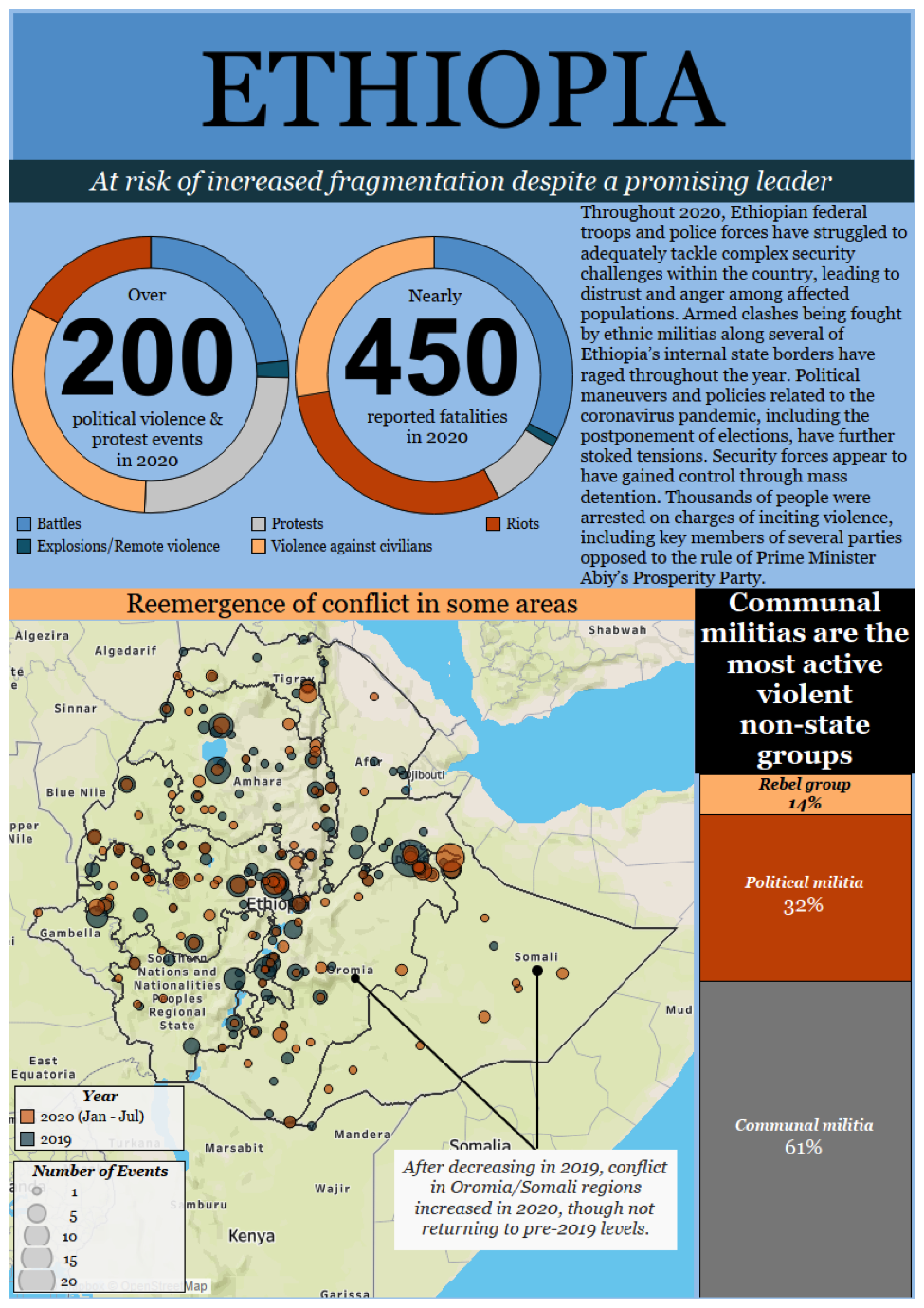ETHIOPIA
In January, ACLED warned that Ethiopia was at risk of increased fragmentation despite a recent change in government applauded by the international community.
Simmering political tensions heightened by delayed elections and a weak security apparatus have exploded in recent weeks across Ethiopia’s ethnically-based federal states in a string of deadly riots, ethnic killings, and mass arrests of political opposition leaders.
Throughout 2020, Ethiopian federal troops and police forces have struggled to adequately tackle complex security challenges within the country, leading to distrust and anger among affected populations.

Armed clashes being fought by ethnic militias along several of Ethiopia’s internal state borders have raged throughout the year, leading to the displacement of hundreds of thousands (OCHA, 30 June 2020).
Failure to recover kidnapped students (New York Times, 30 January 2020), inconclusive investigations into a series of high-profile assassinations (International Crisis Group, 3 July 2020), and accusations of serious human rights violations perpetrated by federal forces (Amnesty International, 29 May 2020) have all contributed to concern that Ethiopia’s current government is ill-equipped to handle the complicated security environment that the country’s ethno-federalist system entails.
Political maneuvers and policies related to the coronavirus pandemic in the country’s capital Addis Ababa have further stoked tensions. Following a vote by lawmakers to postpone national elections until after the coronavirus is deemed to no longer be a threat (Al Jazeera, 10 June 2020), opposition parties insisted that a coalition government be formed instead of allowing the prime minister to continue to lead.
One opposition party accused the government of having no genuine interest in holding elections and submitted that Prime Minister Abiy Ahmed was using the coronavirus pandemic as “an excuse to establish a one-man dictatorship” (Reuters, 5 May 2020).
The speaker of the house, a member of the ruling party in Ethiopia’s Tigray region, resigned, saying that she “refuses to work with a group that violates the constitution on a daily basis and promotes dictatorship” (BBC Amharic, 8 June 2020).
Tensions stoked throughout the year exploded on 29 June following the assassination of a popular Oromo musician in the capital by unknown gunmen.
The assasination was promptly positioned within a long history of ethno-nationalist political violence in Ethiopia, and an entrenched narrative of marginalisation within the Oromo community.
Within hours, violent riots engulfed cities and towns across Oromia regional state, with mobs of Oromo youth clashing with police and rival groups.
Security forces were reportedly unable to contain the violence and stood by as ethnic and religious minorities were killed and their businesses torched around the region. Intense crackdowns and street battles ensued, leaving over 230 people dead (Washington Post, 8 July 2020).
As the country reels from the latest bout of violence, security forces appear to have gained control through the use of mass detention and violent repression.
Thousands of people were arrested on charges of inciting violence, including key members of several parties opposed to the rule of Prime Minister Abiy’s Prosperity Party (Addis Standard, 2 July 2020).
With key opposition party members jailed, national elections delayed, and ethnic tensions at an all-time high, Ethiopia faces serious risks of widespread political violence escalating during the second half of 2020.
If you want to read the articles in order, click on PREVIOUS or NEXT PAGE
Or, Please click through the drop-down menu below to jump to specific cases.
MEXICO
YEMEN
INDIA
SOMALIA
IRAN
AFGHANISTAN
ETHIOPIA
LEBANON
UNITED STATES
ACLED / Balkantimes.press


